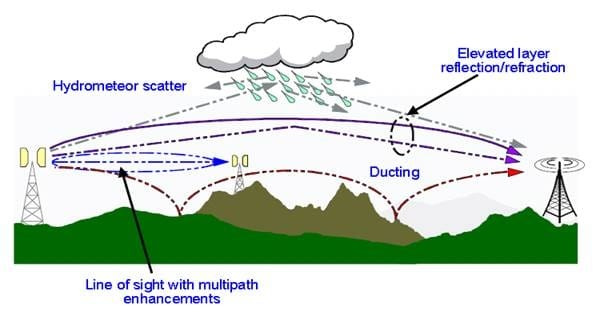Hello dears.
Anyone here knows have some effects or interference of water / humidity in radio waves?
Absorption, reflection… and the effects on KPIs?
Any comment appreciated
Yes: a known phenomenon impact the propagation of the electromagnetic waves and is called “atmospheric ducting mode”, where the waves are bent by the atmospheric refraction as shown below.

Using this mode, the downlink signal of the interferer eNB can travel for hundreds of Km which will result by an additional time offset when arriving to the interfered area, this delayed DL signal will impact the uplink signal of TDD subframe (it will be considered as interference compared to our useful UL signal)

In case of coastal areas the impact of phenomena will increase with the increase of the temperature (Evaporation of sea water increase => hydrometer scatter).
You can expect to experience regularly this kind of degradation during Spring and Summer until the temperature will decrease (starting from Autumn).
Huawei have a term for this, its called long distance interference and some counters used to measure in first and last symbol to detect the phenomenon.
Ssp 7 can be adjusted to 5 to minimize the impact but sure throughput will be degraded.
Hi @Indraparin,
And this is actually what we did in our case, we changed SSP from 7 to 5 and it helped however throughput degraded as expected.
Hi, many researchers have tried to investigate the effects of factors like rain, fog, water vapor etc., especially on mmWave frequencies. 5G/IMT 2020 is using the mmWave/ GHz range of frequencies according to the TS 38.000 specifications.
The free space path loss in radio applications is directly proportional to the square of the frequency, so higher the frequency used, higher will be the resulting loss. Experiments show that compared to the free space pathloss for a given distance at 2.4GHz, the FSPL is about 22dB larger for 28GHz and about 32dB larger for 100GHz.
Recommendation ITU-R P.840-3(2013) discloses the attenuation due to fog/rain increasing considerably with the frequency range increase.